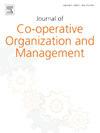Bridging co-operation’s communication gap: The Statement on the Co-operative Identity, the sociology of co-operative education’s shifting terrain, and the problem of public opinion
Abstract
This article focuses on co-operatives’ faltering position in 21st century Canadian public opinion. I argue co-operative education’s introverted bias toward ‘boardrooms and classrooms’ neglects public opinion; and that shifting international norms and historical conditions have reinforced this retreat from mass media and the public sphere. A co-operative communication gap of international significance is the result. Cultural hegemony theory and qualitative methods are used to develop the argument. Historical analysis first demonstrates that educational conventionalism dangerously discounts the contemporary cultural environment’s threat to mutualism. It is argued that the International Co-operative Alliance’s (ICA) contradictory doctrine has deepened normative confusion about co-operative education’s scope, further delaying media activism and popular education. Textual analysis illustrates this contradiction in key documents. These include the Report of the ICA Commission on Co-operative Principles (1967), the Statement on the Co-operative Identity (1995), and the Guidance Notes to the Co-operative Principles (2016). Finally, conjunctural analysis shows that contradictory tendencies inside and outside international mutualism reshaped an inward-turning pedagogy from 1995 to 2016. Findings thus extend our understanding of the communication gap by accounting for barriers to popular educational innovation, both conceptual and strategic.

 求助内容:
求助内容: 应助结果提醒方式:
应助结果提醒方式:


